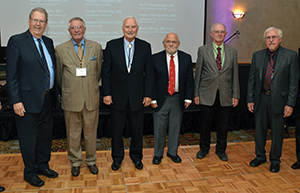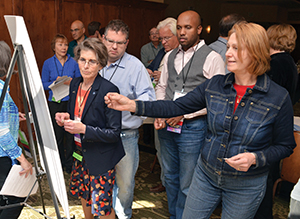CMS physicians make historic changes
House of Delegates votes overwhelmingly to re-engineer CMS governance into a grassroots-centric model designed to engage all physicians
by CMS staff report, photos by Kate Alfano
At the Colorado Medical Society’s 145th Annual Meeting, the House of Delegates, in response to a comprehensive set of governance retooling proposals developed over the past year by a special CMS task force, voted overwhelmingly to dissolve themselves into a realigned governance model that connects a streamlined board to the widest possible spectrum of its physician constituencies.
“The governance reforms adopted over the weekend were about member voice and empowerment and the ability of CMS to recruit and harness the intellectual and political muscle of physicians,” said CMS President Michael Volz, MD. “We will then infuse that expertise into the boardrooms and halls of the legislature and Congress.”

Newly elected CMS President-elect, Katie Lozano, MD, center, is escorted to the podium to address the House of Delegates by CMS President Michael Volz, MD, left, and CMS Immediate Past President Tamaan Osbourne-Roberts, MD, right.
The adopted revisions contemplate extensive interactions between board members and the array of medical communities on policy direction and deployment, as well the recruitment and involvement of emergent leadership drawn from a methodical process of issue-centric policy development.
“We will be building a farm system of our best and brightest, and engage them where their ideas and insights will have real-world consequences,” Volz said.
Additional highlights from the meeting include the following.
- Katie Lozano, MD, was elected CMS president-elect. In addition, Drs. Ray Painter, Lynn Parry and Brigitta Robinson were elected AMA Delegates while Drs. David Downs, Jan Kief and Tamaan Osbourne-Roberts were elected AMA Alternate Delegates.
- Michael Volz, MD, was installed as CMS president. In his inauguration speech he predicted that public policy would be the topic to dominate his year but he remains hopeful for positive outcomes because of Colorado’s health policy and business leaders who have a long history of commitment to fixing problems rather than assigning blame. “We have policy advancements in system delivery that are to this day still unapproachable and not possible in many states, and we are fully engaged even now on multiple fronts.”
- The Board of Directors and the House of Delegates voted to highly prioritize network adequacy and access for the rest of the decade based on the results of an all-member survey on managed care pain points.
- Additional priorities will be maintaining Medicaid primary code parity with Medicare and the impact of impending insurance industry mergers on physicians and patients.
- U.S. Sen. Michael Bennet was the keynote speaker at Saturday’s AMA-COMPAC luncheon (see article on page 15).
“Stark” results from all-member survey on managed care
CMS pollster Benjamin Kupersmit presented “stark” findings from an all-member survey on managed care pain points at the Sept. 18 Board of Directors meeting. When informed of the survey results, the House of Delegates voted to make payer issues a high priority for the remainder of the decade.
The survey was sent to all CMS members in active practice. The normal number of responses to CMS surveys falls between 400 and 500; nearly 900 physicians completed this year’s survey, demonstrating its “incredible relevance,” Kupersmit said.
Results showed significant levels of concern regarding prior authorization, reimbursement, network adequacy and determination of out-of-network status – and these concerns intensify for smaller practices, particularly solo practitioners. There is “intense support” among members for a range of suggested reforms to address some of the challenges physicians have reported regarding payer networks, including the following.
- Require insurers to publish and maintain accurate, real-time online directories for patients and providers (84 percent of respondents strongly support and 11 percent somewhat support this action).
- Require health plans to explain in writing why a physician or practice has been rejected or removed from a network (83 percent strongly support, 11 percent somewhat support).
- Require insurers to give patients a card that can be swiped or scanned at any office to determine eligibility, co-pay, deductible, etc., including a reader or app that will work for all Colorado health plans (74 percent strongly support, 16 percent somewhat support).
- Mandate clear standards for the criteria to determine that a health plan’s network has an adequate number of physicians in a given specialty to serve a given geographic area (72 percent strongly support, 17 percent somewhat support).
- Require health plans to publish clear guidelines and requirements for physicians wishing to join their networks (70 percent strongly support, 17 percent somewhat support).
- Require health plans to regularly send written, individualized notice to physicians of their participation status in each of the health plan’s product offerings (54 percent strongly support, 26 percent somewhat support).
This survey establishes a data baseline on the current interaction between physicians and insurance companies in Colorado, identifying what is and is not working in terms of access to networks, network de-selections, payment for out-of-network care and what can be done to repair problems in these areas.
Issues around networks and insurance industry mergers will be debated in the executive and legislative branches of the state government next year and CMS will continue to follow the issues in play, engage members to be involved in advocacy and solicit member feedback on further issues that need attention.
Kupersmit said addressing these concerns is “vital to the survival” of solo practitioners and “critical to the future” of small-to-medium practices with physician owners. “Ideas with 70 percent strong support or higher represent a tremendous opportunity to make a difference for members in their day-to-day practice.”
Thank you to all physicians and guests who participated in the 145th Annual Meeting. Save the date for next year’s restructured annual meeting, Sept. 16-18, 2016, at the Keystone Resort in Keystone, Colo.



Top: CMS members celebrate 50 years since graduating from medical school. Middle: Members of the medical school component and their guests enjoy the Friday night exhibitor reception. Bottom: Board of Director members vote for the top CMS priorities for 2016.
Posted in: Colorado Medicine | Governance Reform

Comments
Please sign in to view or post comments.